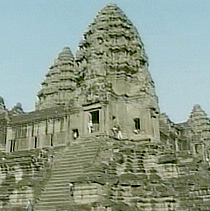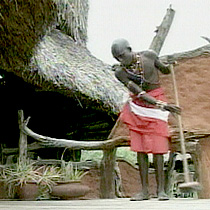2007年VOA标准英语-Momentum Growing for Responsible Tourism(在线收听)
Washington, D.C.
10 July 2007
A worldwide poll of more than 100 million people has selected what it calls the new seven wonders of the world. The on-line poll picked:
- the Roman Coliseum
- the Taj Mahal
- the Great Wall of China
- Machu Picchu in Peru
- the Petra archaeological site in Jordan
- the massive Christ the Redeemer sculpture in Brazil
- the Great Pyramids of Egypt.
The new wonders are expected to boost tourism to some popular destinations, but it is also prompting some serious rethinking on the responsibility of tourists. VOA's Mil Arcega reports.
 |
| The Pyramids of Giza |
Of the original seven wonders of the world, only the Pyramids of Giza are still standing. But the organizers of the New Seven Wonders say there is no shortage of wonders in the world.
Tia Viering is communications chief for the Zurich-based committee. "A wonder, we have been known to say in the past, is what makes you wonder,” says Viering. “It makes you stop and it takes your breath away for a second and you think 'Oh wow! Why? How? Who? When?' And it's not just a building that you think, 'Oh, that's sort of a nice building' -- it takes your breath away and it emotionally touches you."
 |
| The ancient temples of Angkor Wat |
Viering says the difficulty was choosing only seven from a list of 21 of the world's most awe-inspiring sites. Among them, the ancient temples of Angkor Wat. Some fear rampant tourism is destroying one of Cambodia's most popular destinations.
Historical preservationist John Stubbs is with the World Monument Fund. "There's not a minute to waste in looking after this precious place because, without a doubt, it could be ruined by some wrong decisions," says Stubbs.
Inaccessible for many years, these monuments built for a 12th century king attract more than two million visitors every year. From just two hotels 10 years ago, today there are more than 100. In what was once jungle, new shopping malls, pizza restaurants and massage parlors dot the landscape.
Even tourists have mixed feelings about the commerce surrounding what were once places of worship.
People had various reactions. "I think it takes away from it, I do," says one.
"I don't,” says another. “I feel that the importance of this place deserves people to watch it, see it, witness it."
Although the influx of tourists has brought jobs and millions of dollars to the local Cambodian economy, Stubbs fears greed will ultimately win out over preservation. It is a threat some communities are taking seriously.
 |
| A villiager is employed at the luxury lodge |
"Here 100 percent of everything is managed, right from the board, everything and all the management decisions that are made here are made by the community themselves,” says Lodge general manager Njalis Shuel. “And all the mistakes that we make, we make it and we learn from those mistakes."
Before the Masai community took ownership of the land, it was overgrazed, cattle rustling and poaching were prevalent and Shuel says poverty was very high. But today the lodge generates income for 6,000 villagers and helps pay for the education of 500 students.
Margaret Bailey is visiting from Great Britain. "My hope is that here, first of all, it will be the local people who are benefiting from the tourism and that their way of life is being supported by my coming here as far as possible, rather than being in some way gradually destroyed by an influx of tourists,” says Bailey.
Village elders say all decisions on community development are determined by its impact on local culture, the environment and on Africa's best-loved animals.
Although small in comparison to popular destinations, the lodge is seen as an example of how responsible tourism can help generate income in poor communities while preserving the world's wonders for generations to come.